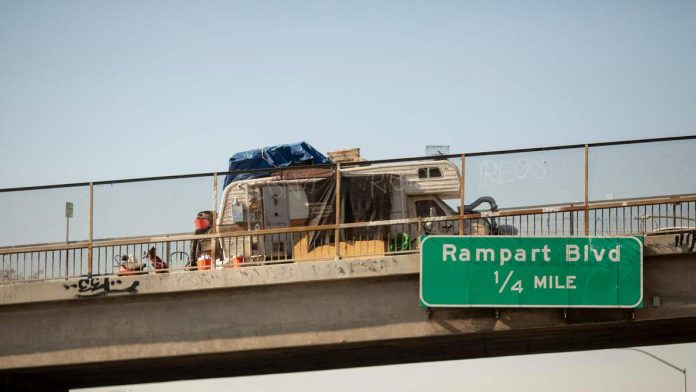LOS ANGELES (CNS) – In a move to address recreational vehicles being used as housing across Los Angeles, the City Council is moving forward Thursday with an effort aimed at identifying areas where RVs would be prohibited, while also exploring parking locations where the big vehicles might be allowed.
The council voted unanimously Wednesday in favor of a motion introduced by Eunisses Hernandez, Katy Yaroslavsky and Hugo Soto-Martinez, calling for reports back on the effectiveness of the city’s current Oversized Vehicle Ordinance and data on the overall impact of RVs in restricted areas.
Additionally, council members advanced a motion spearheaded by Councilwoman Traci Park, who is calling for citywide program to prohibit RV parking in residential areas, commercial corridors and other “sensitive uses.” Several city departments are expected to provide reports back on that motion as well.
Hernandez had attempted to move forward her motion with an amendment aimed at establishing a task force to lead a “holistic conversation” and identify solutions addressing RV encampments — led by health experts, residents and other stakeholders.
“We keep doing the same things over and over and over again, and expecting different results,” Hernandez said. “We keep responding to harm after it happens. We keep responding to abuse after it happens. This will help us get more information.”
However, the councilwoman’s amendment failed in a 4-10 vote. Council members Hugo Soto-Martinez, Marqueece Harris-Dawson and Heather Hutt backed Hernandez. Councilwoman Nithya Raman was absent during the vote.
Park said she couldn’t support the amendment because it was “duplicative” of multiple existing programs and processes.
“The crisis in front of us today is urgent,” Park said. “The last thing we need is another committee, another commission or another task force over multiple years to tell us what we already know — that these RVs are unsafe, unsanitary and causing irreparable harm in our communities.”
The councilwoman warned of a “flood gate” that’s about to open in the city. She added, “We are six weeks post-Grants Pass, and we haven’t adjusted a single policy in the city of Los Angeles to account for what other communities in California and beyond are doing in response … or what’s being done in response to the governor’s recent order.”
In June, the U.S. Supreme Court ruled that cities can regulate and issue penalties for camping on public land. A month later, Gov. Gavin Newsom ordered state agencies to take down homeless encampments — though cities ultimately have a say on encampment removal.
Councilwoman Monica Rodriguez also opposed the amendment, citing the city was on the “precipice” of having a formalized and procedural way of moving forward on RV encampments.
Hernandez argued that with the task force the city can be more transparent and come to actual solutions instead of piecemealing it.
“We give out citations for these RVs, and we don’t even collect half of the amount of those citations,” Hernandez said. “We don’t have enough staff to collect those citations. There’s a lot of issues around citing these vehicles and getting them towed. We cannot wait for these piecemeal polices to get us out of this crisis.”
Park’s motion — seconded by Council President Paul Krekorian, Bob Blumenfield, Yaroslavsky and Imelda Padilla — was moved forward with little to no debate. Several city departments are expected to provide reports back on the following:
— locations in each council district where oversized vehicle dwellings can park on the public right of way, outside of residential areas, commercial corridors and other sensitive uses;
— a permit requirement, free of charge, to participate in the program;
— provision of shower and restroom services, similar to the city’s Mobile Pit Stop/Shower Stop program;
— regular sanitation services, including waste disposal and trash collection;
— provision of wrap-around services and safety; and
— changes to the city’s Municipal Code that may be required.
According to the 2024 Greater Los Angeles Homeless Count, unhoused individuals using RVs as dwellings increased to 6,845 from 6,814 in 2023 across the county. The Los Angeles Homeless Services Authority, which conducts the count annually, reported some 13,549 individuals experiencing homelessness in their vehicles in 2024, representing a decrease compared to 14,096 individuals experiencing homelessness in their vehicles last year.
In 2013, the city allowed City Council members to propose and pass resolutions prohibiting owners and/or drivers of oversized vehicles (over 22 feet in length or over 7 feet in height) from parking them during the hours of 2 a.m. to 6 a.m. in restricted zones, as designated by street signs. In instances where the individual who parked the vehicle is not the owner, city law also may criminalize the owner of the vehicle.
Enforcement can only take place when signs are in place giving notice of the restriction.
The city is also exploring a permitting system for RVs, assessing the feasibility and cost of waste pumping services, enforcing against so-called “van-lords,” and implementing rehousing pilot programs such as that of Rodriguez’s RV-to-Home program.

Recent Comments